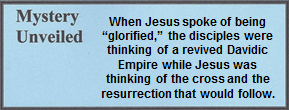13.02.06 Jn. 12:20-26
JESUS EXPLAINS THE PURPOSE OF HIS DEATH
20 Now some Greeks were among those who went up to worship at the festival. 21 So they came to Philip, who was from Bethsaida in Galilee, and requested of him, “Sir, we want to see Jesus.”
22 Philip went and told Andrew; then Andrew and Philip went and told Jesus.
23 Jesus replied to them, “The hour has come for the Son of Man to be glorified. 24 “I assure you:
Unless a grain of wheat falls to the ground
and dies,
it remains by itself.
But if it dies,
it produces a large crop.
25 The one who loves his life
will lose it,
and the one who hates his life in this world
will keep it for eternal life,
26 If anyone serves Me
He must follow Me.
Where I am,
There My servant also will be.
If anyone serves Me
the Father will honor him.
While Jesus told His disciples that He would face death, they could not comprehend His words. They could not imagine that someone who performed such incredible miracles and raised the dead would permit Roman tyranny to kill him. Rather, their anticipation was like that of everyone else; they continued to think that He would establish a revived Davidic Empire.

“Now some Greeks … went up to worship.” Some Greeks worshiped the God of Abraham, Isaac and Jacob. To qualify to worship in the temple, Gentiles were required to affirm one of the following:
- Convert to Judaism, and be circumcised, or
- Worship God as Gentiles and affirm that they observe the Noahide Commandments.[1]
Those who went through the rite of circumcision could worship anywhere within the temple where other Jewish men worshiped, but those who observed the Noahide Commandments could worship only in the Court of the Gentiles. They became known as “God-fearers.” They were not Hellenized Jews or Jews from the Diaspora, but Gentiles, who observed the Jewish faith.[2] Like the magi some three decades earlier, they represented the multitudes of Gentiles that would come to Him in the future from every nation of the world. Some of them later became Christians and consorted with Paul and Silas at Thessalonica (Acts 17:4). The Jewish people placed Gentiles in three categories:[3]
- The Ben Noah, meaning Sons of Noah, who observed the Noahide Commandments. They were also known as “Righteous Gentiles,” “God-fearers,” and “Proselytes of the Gate.” When the early church was getting established, the Jerusalem Council met (Acts 15) to determine if Gentile converts had any further obligation beyond the Noahide Laws, other than repentance and baptism.[4]
- The Akkum, who did not observe the Noahide Laws (sometimes referred to as dogs).
- The Ger Toshav, who were those persons who, under oath, stood before a Jewish judge, stated they had two intentions:
- To reside in Israel and, if permitted,
- Their intention to faithfully observe the seven Noahide Laws.
A Gentile man could be honored and respected as a Ben Noah without circumcision, but if he wanted to become a full-pledged Jew, then the painful circumcision was required. For that reason, it is generally accepted that many women and few men converted to Judaism.
Finally, this passage challenges the common opinion that the Jews did not attempt to evangelize the world. While most of the national leadership of Israel had no interest in this matter, and some even hated the Gentiles, God always has His remnant few to do His work. While the Jews as a whole failed to bring the Word of God to the Gentiles, it must not be stated exclusively that all Jews failed in this calling.
“Unless a grain of wheat falls to the ground and dies.” Everyone understood that wheat, the most prized grain, dies at the end of the harvest season. Yet seeds that die bring forth life when planted. Likewise, here, Jesus told His disciples that life in Him could come to them only through complete death to self and dedication to Him.
“The one who hates his life in this world.” This is a phrase of comparison and a reflection of the seed that dies. The believer’s love and dedication for Christ must be so intense that, in comparison, the concerns for his own well-being are so minute as to appear to be hatred. The word world, as John used it, means a human society organizing itself without God.[5]
[1]. The Noahide Commandments were and continue to be, in the opinion of orthodox Jews, divine laws that Gentiles need to obey to obtain favor with God if they did not want to convert to Judaism. See Appendix 17 for more information.
[2]. Geikie, The Life and Words of Christ. 2:254.
[3]. Moseley, Yeshua: A Guide to the Real Jesus and the Original Church. 57.
[4]. See Acts 2:10; 6:5; 13:43.
[5]. Barclay, “John.” 2:185.